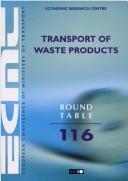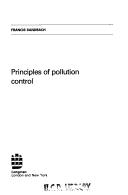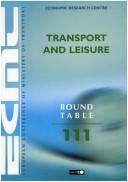| Listing 1 - 10 of 33 | << page >> |
Sort by
|

ISBN: 1280080833 9786610080830 9282112853 9282113647 Year: 2001 Publisher: Paris : OECD Publishing,
Abstract | Keywords | Export | Availability | Bookmark
 Loading...
Loading...Choose an application
- Reference Manager
- EndNote
- RefWorks (Direct export to RefWorks)
With the treatment of waste set to increase -- since the volume of waste is closely related to economic growth -- waste transport will be a major challenge in the future. This raises several issues. Should transport regulations be made more stringent and their implementation reviewed? Should the proximity principle -- incorporated in the regulations in the interests of environmental protection -- be questioned, since it prevents the consolidation of flows in sufficient volume to make the most environmentally-friendly modes of transport viable? The environmental performance of waste transport can be established only within the framework of an overall approach which incorporates all waste treatment routes. We must indeed be wary of seemingly good ideas such as "waste transport must be restricted" or "recycling is the best solution". The closure of landfills or reprocessing could well lead to a large increase in waste transport. The Round Table picks up on these issues and uses the cases of different countries to examine, in turn, developments in the waste transport sector and the statistical problems encountered in trying to understand them, the regulations applicable to the modes of transport used and their environmental performance, focusing closely on the difficulties created by the current modal split in this sector.
Waste products --- Transportation --- By-products --- Industrial wastes --- Products, Waste --- Trades-waste --- Utilization of waste --- Waste materials --- Manufacturing processes --- Factory and trade waste --- Recycling (Waste, etc.) --- Refuse and refuse disposal --- Scrap materials --- Substitute products --- Waste spills

ISBN: 0582300428 Year: 1982 Publisher: London Longman
Abstract | Keywords | Export | Availability | Bookmark
 Loading...
Loading...Choose an application
- Reference Manager
- EndNote
- RefWorks (Direct export to RefWorks)
Hydrosphere --- Factory and trade waste --- Pollution --- Chemical pollution --- Chemicals --- Contamination of environment --- Environmental pollution --- Contamination (Technology) --- Asbestos abatement --- Bioremediation --- Environmental engineering --- Environmental quality --- Hazardous waste site remediation --- Hazardous wastes --- In situ remediation --- Lead abatement --- Pollutants --- Refuse and refuse disposal --- Factory waste --- Industrial effluents --- Industrial wastes --- Solid waste management --- Trades-waste --- Wastewaters --- Plant engineering --- Centralized industrial waste treatment facilities --- Waste products --- Environmental aspects
Book
ISBN: 9280713035 9789280713039 Year: 1991 Volume: 7 Publisher: Vienne : Paris : United nations industrial development organization United nations environment programme (UNEP) = Programme des nations unies sur l'environnement (PNUE),
Abstract | Keywords | Export | Availability | Bookmark
 Loading...
Loading...Choose an application
- Reference Manager
- EndNote
- RefWorks (Direct export to RefWorks)
Waste minimization --- Factory and trade waste --- -Measurement --- -Waste minimization --- Minimization of waste --- Reduction of waste --- Waste reduction --- Conservation of natural resources --- Pollution prevention --- Refuse and refuse disposal --- Factory waste --- Industrial effluents --- Industrial wastes --- Solid waste management --- Trades-waste --- Wastewaters --- Plant engineering --- Centralized industrial waste treatment facilities --- Pollution --- Waste products --- Measurement --- Waste minimization. --- Measurement. --- Factory and trade waste - - Measurement --- -Factory and trade waste
Book
ISBN: 0128009128 0128000570 9780128009123 9780128000571 Year: 2015 Publisher: Amsterdam
Abstract | Keywords | Export | Availability | Bookmark
 Loading...
Loading...Choose an application
- Reference Manager
- EndNote
- RefWorks (Direct export to RefWorks)
Risk Analysis and Control for Industrial Processes - Gas, Oil and Chemicals provides an analysis of current approaches for preventing disasters, and gives readers an overview on which methods to adopt. The book covers safety regulations, history and trends, industrial disasters, safety problems, safety tools, and capital and operational costs versus the benefits of safety, all supporting project decision processes. Tools covered include present day array of risk assessment, tools including HAZOP, LOPA and ORA, but also new approaches such as System-Theoretic Process Analysis (STPA), Blended HAZID, applications of Bayesian data analytics, Bayesian networks, and others. The text is supported by valuable examples to help the reader achieve a greater understanding on how to perform safety analysis, identify potential issues, and predict the likelihood they may appear. Presents new methods on how to identify hazards of low probability/high consequence events Contains information on how to develop and install safeguards against such events, with guidance on how to quantify risk and its uncertainty, and how to make economic and societal decisions about risk Demonstrates key concepts through the use of examples and relevant case studies.
Factory and trade waste -- Management. --- Manufacturing processes -- Environmental aspects. --- Risk management. --- Civil & Environmental Engineering --- Engineering & Applied Sciences --- Environmental Engineering --- Factory and trade waste. --- Factory and trade waste --- Environmental aspects. --- Pollution --- Factory waste --- Industrial effluents --- Industrial wastes --- Solid waste management --- Trades-waste --- Wastewaters --- Plant engineering --- Centralized industrial waste treatment facilities --- Refuse and refuse disposal --- Waste products
Periodical
Abstract | Keywords | Export | Availability | Bookmark
 Loading...
Loading...Choose an application
- Reference Manager
- EndNote
- RefWorks (Direct export to RefWorks)
Factory and trade waste --- Manufactures --- Déchets industriels --- Usines --- Management --- Environmental aspects --- Gestion --- Périodiques. --- Aspect de l'environnement --- Management. --- Environmental aspects. --- Manufactured goods --- Manufactured products --- Products --- Products, Manufactured --- Factory waste --- Industrial effluents --- Industrial wastes --- Solid waste management --- Trades-waste --- Wastewaters --- Périodiques --- Commercial products --- Manufacturing industries --- Plant engineering --- Centralized industrial waste treatment facilities --- Pollution --- Refuse and refuse disposal --- Waste products --- Produits manufacturés --- Periodicals.

ISBN: 1280080825 9786610080823 9264182373 928211256X Year: 2000 Publisher: Paris : OECD Publishing,
Abstract | Keywords | Export | Availability | Bookmark
 Loading...
Loading...Choose an application
- Reference Manager
- EndNote
- RefWorks (Direct export to RefWorks)
Leisure-related transport is a poorly known and widely underestimated phenomenon. And yet, it generates more traffic than journey-to-work travel. Indeed, the great number of leisure activities that involve transport range from shopping, visiting family or friends and sporting activities to local and international tourism. This book sets out to describe and analyse leisure-related transport in terms of flow size, points of concentration, modes of transport, temporal trends and structural changes. It then examines the consequences that growth in leisure activities could have for transport policy: integrating local and long-distance transport, increasing the use of environmentally-friendly means of transport, promoting local recreational trips or improving the living environment. This may be seen as a genuine opportunity for policymakers: in responding to the challenge posed by leisure-related transport they can indeed respond to the challenges posed by any kind of transport.
Recreation areas -- Great Britain. --- Transportation -- Europe -- History. --- Transportation -- Great Britain. --- Transportation. --- Urbanization -- Europe -- History. --- Waste products --- Transportation --- By-products --- Industrial wastes --- Products, Waste --- Trades-waste --- Utilization of waste --- Waste materials --- Manufacturing processes --- Factory and trade waste --- Recycling (Waste, etc.) --- Refuse and refuse disposal --- Scrap materials --- Substitute products --- Waste spills
Book
ISBN: 0444636765 044463665X 9780444636768 9780444636652 Year: 2017 Publisher: Amsterdam Elsevier
Abstract | Keywords | Export | Availability | Bookmark
 Loading...
Loading...Choose an application
- Reference Manager
- EndNote
- RefWorks (Direct export to RefWorks)
Biotechnology. --- Bioengineering. --- Factory and trade waste. --- Factory waste --- Industrial effluents --- Industrial wastes --- Solid waste management --- Trades-waste --- Wastewaters --- Plant engineering --- Centralized industrial waste treatment facilities --- Pollution --- Refuse and refuse disposal --- Waste products --- Biological engineering --- Life science engineering --- Biology --- Engineering --- Synthetic biology --- Chemical engineering --- Genetic engineering
Book
ISBN: 9535134868 953513485X 953514667X Year: 2017 Publisher: IntechOpen
Abstract | Keywords | Export | Availability | Bookmark
 Loading...
Loading...Choose an application
- Reference Manager
- EndNote
- RefWorks (Direct export to RefWorks)
The book points out that rural regions need proper attention at the global level concerning solid waste management sector where bad practices and public health threats could be avoided through traditional and integrated waste management routes. Solid waste management in rural areas is a key issue in developing and transitioning countries due to the lack of proper waste management facilities and services. The book further examines, on the one hand, the main challenges in the development of reliable waste management practices across rural regions and, on the other hand, the concrete solutions and the new opportunities across the world in dealing with municipal and agricultural wastes. The book provides useful information for academics, various professionals, the members of civil society, and national and local authorities.
Green technology. --- Sanitary engineering. --- Factory and trade waste. --- Factory waste --- Industrial effluents --- Industrial wastes --- Solid waste management --- Trades-waste --- Wastewaters --- Plant engineering --- Centralized industrial waste treatment facilities --- Pollution --- Refuse and refuse disposal --- Waste products --- Engineering, Sanitary --- Environmental health engineering --- Engineering --- Public health --- Buildings --- Sanitation --- Earth-friendly technology --- Environmental technology --- Technology --- Environmental engineering --- Life Sciences --- Waste Management --- Environmental Sciences --- Solid Waste
Book
ISBN: 1306301947 9781780401416 1843393077 1680155725 1780401418 Year: 2010 Publisher: London, [England] : IWA Publishing,
Abstract | Keywords | Export | Availability | Bookmark
 Loading...
Loading...Choose an application
- Reference Manager
- EndNote
- RefWorks (Direct export to RefWorks)
This book covers the most recent scientific and technological developments in the field of chemical oxidation processes applicable for the efficient treatment of biologically-difficult-to-degrade, toxic and/or recalcitrant effluents originating from different manufacturing processes. It is a comprehensive review of process and pollution profiles as well as conventional, advanced and emerging treatment processes & technologies developed for the most relevant and pollution (wet processing)-intensive industrial sectors. It addresses chemical/photochemical oxidative treatment processes, case-specific treatability problems of major industrial sectors, emerging (novel) as well as pilot/full-scale applications, process integration, treatment system design & sizing criteria (figure-of-merits), cost evaluation and success stories in the application of chemical oxidative treatment processes.
Chemical technology --- fysicochemische afvalwaterzuivering --- redoxreacties --- chemische afvalwaterzuivering --- cosmetische industrie --- farmaceutische industrie --- metaalverwerkende industrie --- confectie-industrie --- industrieel afvalwater --- Waste products. --- Sewage --- Oxidation --- Sewage disposal --- By-products --- Industrial wastes --- Products, Waste --- Trades-waste --- Utilization of waste --- Waste materials --- Manufacturing processes --- Factory and trade waste --- Recycling (Waste, etc.) --- Refuse and refuse disposal --- Scrap materials --- Substitute products --- Waste spills --- Purification --- Oxidation.
Book
ISBN: 012815442X 0128150602 9780128154427 9780128150603 Year: 2019 Publisher: Amsterdam
Abstract | Keywords | Export | Availability | Bookmark
 Loading...
Loading...Choose an application
- Reference Manager
- EndNote
- RefWorks (Direct export to RefWorks)
Factory and trade waste --- Refuse and refuse disposal. --- Discarded materials --- Disposal of refuse --- Garbage --- Household waste --- Household wastes --- Refuse and refuse disposal --- Rubbish --- Solid waste management --- Trash --- Waste disposal --- Waste management --- Wastes, Household --- Sanitation --- Pollution --- Pollution control industry --- Salvage (Waste, etc.) --- Street cleaning --- Waste products --- Factory waste --- Industrial effluents --- Industrial wastes --- Trades-waste --- Wastewaters --- Plant engineering --- Centralized industrial waste treatment facilities --- Environmental aspects
| Listing 1 - 10 of 33 | << page >> |
Sort by
|

 Search
Search Feedback
Feedback About UniCat
About UniCat  Help
Help News
News